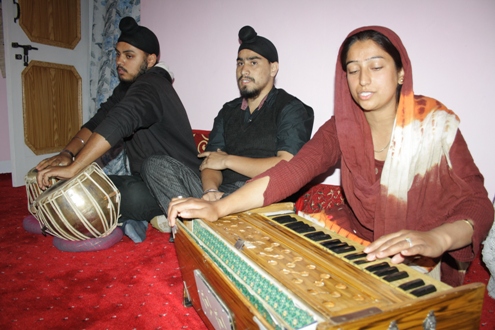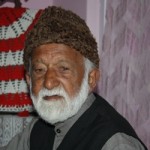Srinagar, JAMMU & KASHMIR :
A Muslim woman is taking Sikh boys and girls in Srinagar closer to their religion by teaching them kirtan singing. Tasleema Langoo is a regular at Gurduwaras and finds applause even in the Golden Temple. Shazia Yousuf reports.
As she recited a shabad from Guru Granth Sahib at the Golden Temple Amritsar, almost everyone was engrossed in the melody of the kirtan. As soon as she finished, an old woman came towards her, almost crying, kissed her hands and hugged her.
“Now you are the voice of Sikh women. You have done what no girl could do, you are the honour of your Sikh community now.” The old woman said while taking off her golden earrings and gifting these to her.
She didn’t know the girl she was praising was a Kashmiri Muslim.
It is a three year old incident, but Tasleema Langoo’s association with kirtan is almost two decades old. The 26-year-old from Shaheed Gunj Srinagar has been teaching Kirtan to Sikh boys and girls since she was 14. She is perhaps the only kirtan tutor for the community in Srinagar.
She comes from a family of musicians. Her great grandfather sang for Maharaja Pratap singh, her grandfather Ghulam Qadir Langoo was a court singer of Maharaja Hari Singh. Her uncles and aunts have worked as musicians with Radio Kashmir. Tasleema’s father Abdul Majeed Langoo teaches music at Women’s college MA road.
Tasleema was five or six years old when some Sikh girls approached her father for learning music for religious purposes. “They were my father’s students from college. They would call him Langoo Veerji and wanted to learn harmonium and tabla from him for kirtan singing. I was the youngest daughter and would follow him like his shadow, watching and observing him,” Tasleema says while composing a shabad for her students at her Alochi Bagh residence where the family has recently moved in.
Every morning, Sikh girls would come with a shabad from Guru Granth Sahib and Tasleema’s father would compose it for them, “I would sing with them. Though there was music in every room of our house, but kirtan would excite me most,” she says.
It went on for many years. The students kept changing. And Tasleema’s love for kirtan compositions kept growing. She insisted on joining her father’s class where she would help his students in playing instruments who in turn would write shabads in Urdu (Arabic script) for her, “I was first hesitant, I thought it is disrespecting to sing something we don’t believe or mean. But she loved and respected it more than them,” says Tasleema’s father Majeed.
The class swelled with every day. It was now Tasleema who would sing to the compositions of his father for the students. “They were thrilled to hear her mesmerising voice that they couldn’t find in their community for years. Even the parents of students would come to listen,” says Majeed.
In 1998, when Tasleema was in 8th standard, she decided to start her own coaching class. “By now I was fully trained. The only difficulty was reading Granth Sahib in Punjabi. My father got a Urdu version from Amritsar for me,” she says. Tasleema says, she would start her day with morning prayers (Namaz) and recitation from Quran. “Then I would open Granth Sahib, memorise a new shabad and compose with the help of my father, for my students.”
In 2000, Tasleema left her studies after high school. The same year she gave her first performance in a gurdwara. Tasleema sang in the Gurdwara at Lal Chowk Srinagar on the invitation of a Sikh family. “First not many people were attentive, but when I sang, they were all humming and praising in Punjabi language.” She could hardly understand their words and kept pleading the family not to reveal her Muslim identity.
But when they came to know of her Muslim identity, she earned many blessings. More and more invitations for kirtan darbars followed. “There are two to three invitations in a month. On Sundays I sing in Chatti Padshahi Gurdwara. I sang in many kirtan darbars outside the state. People invite me to sing at Baisakhi and other festivals,” she says.
In 2001, a known singer Harjinder Singh spotted her in Chatti Padshahi gurdwara and advised her to go to Radio Kashmir. She went for an audition, qualified, and began singing kirtans for Radio Kashmir.
Afterwards, late Ghulam Nabi Sheikh encouraged her to go for Kashmiri auditions too. She did and thus began to sing in Kashmiri too for the radio.
Most of her time, however is spent in teaching. She has taught more than 200 Sikh boys and girls. At present she has 15 students. She charges Rs 300 each. And what about her neighbours and relatives. How did they react?
“Our home in Shaheed Gunj was adjacent to mosque. Once I was singing loudly with my students when the mosque imam entered our house. I was ready for a reprimand, but to my surprise, he gave his blessings and told me that I was doing a wonderful job by maintaining communal harmony at a time when our place needed it most,” she says.
Tasleema, however, gave in to her apprehensions in testing times. After the Chattisinghpora Massacre in which 36 Sikhs were killed by unidentified assailants, she stopped her classes. However she could not keep herself away for long and resumed her classes.
For the small Sikh community of Kashmir, she is a saviour of their traditions. “You cannot imagine what she is for our community. It is she who teaches us verses from our holy book every day,” says her student Supinder Singh of Bemina, a postgraduate student at University of Kashmir.
“We never feel she is different from us, she absorbs herself in every verse,” says another student, Manpreet Singh, an engineering graduate.
In 2007, when her magical voice reverberated in the Golden Temple, Sikh religious leader, Harbans Singh visited her house to thank him. “He told me, ‘you are doing us a favour’ and he gave me some money as well,” she says.
source: http://www.kashmirlife.net / Kashmir Life / Home> Faith> Music / by Shazia Yousuf, Kashmir Life / June 27th, 2010











